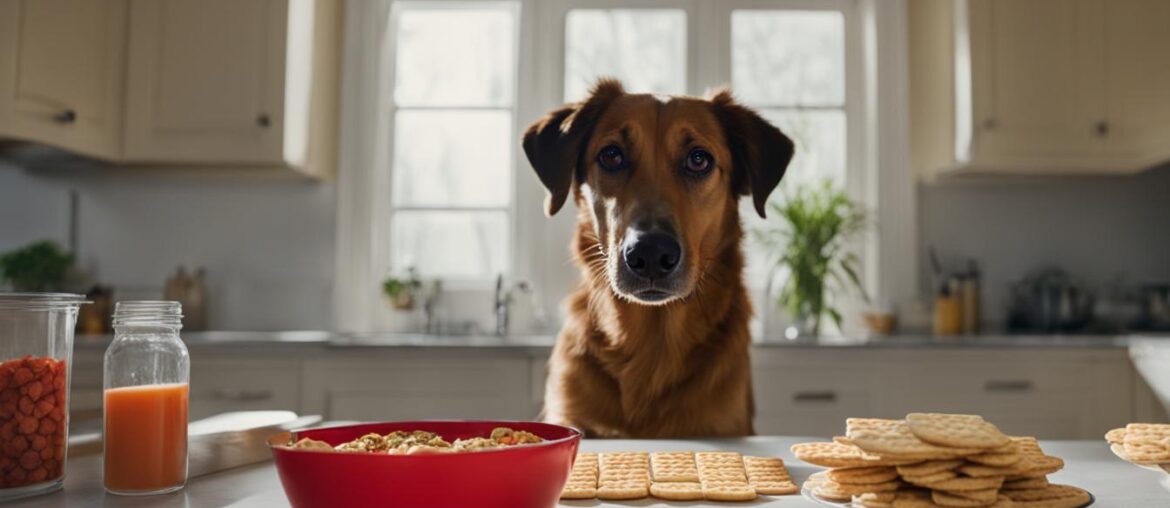Welcome to my article on whether dogs can eat saltine crackers. As a professional in the field of dog nutrition, I am here to provide you with valuable insights into the potential risks and effects of feeding dogs human food, including saltine crackers. Ensuring our furry friends have a proper diet is crucial for their overall health and well-being.
When it comes to canine nutrition, it’s important to understand that dogs have specific dietary needs that differ from humans. While saltine crackers may seem like a harmless and tasty treat, they may not be the best choice for our furry friends. Feeding dogs human food, including crackers, can lead to various health issues, such as stomach upset, allergic reactions, and obesity.
Dog food is specifically formulated to provide the necessary vitamins and minerals for a balanced diet. It contains the right balance of proteins, fats, and carbohydrates to meet a dog’s nutritional needs. While a small quantity of saltine crackers occasionally may not be harmful, they lack significant nutritional value and should not be a regular part of a dog’s diet.
Key Takeaways:
- Feeding dogs human food, including saltine crackers, can lead to various health issues such as stomach upset, allergic reactions, and obesity.
- Dog food is specifically formulated with the necessary vitamins and minerals for a balanced diet.
- Saltine crackers lack nutritional value and should not be a regular part of a dog’s diet.
- It’s important to consult with a vet for guidance on appropriate treats and snacks for your furry friend.
- There are safer alternatives available, such as dog biscuits and homemade dog treats, that provide balanced nutrition for dogs.
Why Are Crackers Unhealthy for Dogs?
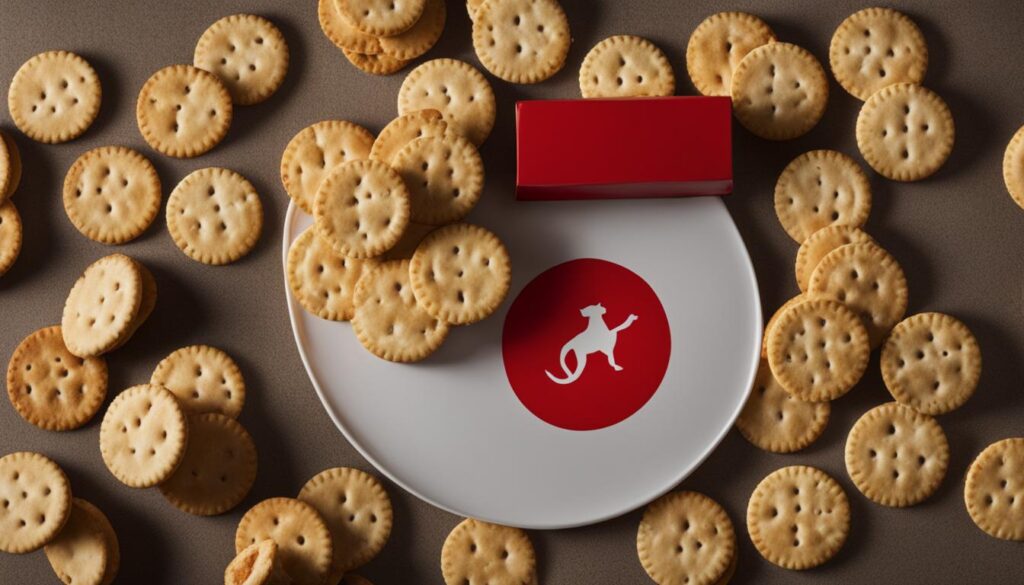
Crackers, including saltine crackers, are primarily made from refined grains, which often have limited nutritional value compared to whole grains. They can also contain high levels of sodium, which is not necessary for a dog’s diet. Excessive sodium intake can lead to health issues such as vomiting, diarrhea, decreased appetite, excessive thirst or urination, and even sodium chloride poisoning.
Additionally, some crackers may contain ingredients that are harmful to dogs, such as garlic and onion, which can cause anemia. It’s crucial to check the ingredients before feeding any crackers to your dog, as even small amounts of these ingredients can be toxic to them.
When it comes to dog nutrition and their overall well-being, it’s best to focus on feeding them a balanced and wholesome diet that meets their specific nutritional needs. Opt for dog-friendly snacks and treats specially formulated to support their health instead of relying on crackers.
Cracker Ingredients to Watch Out For:
- Garlic
- Onion
- High sodium content
Feeding crackers to your dog could put their health at risk, so it’s always best to err on the side of caution and prioritize their well-being above all.
| Health Risks of Crackers for Dogs: | Unhealthy Ingredients in Crackers: | Nutritional Value of Crackers: |
|---|---|---|
|
|
|
What About Unsalted Crackers?
While unsalted crackers may seem like a safer option for dogs, they still lack significant nutritional value. Although they might be lower in sodium, they are still high in carbohydrates and calories. Feeding unsalted crackers to your dog regularly can contribute to weight gain and other health problems associated with a high-carb diet. It’s important to focus on providing your dog with balanced and wholesome dog food rather than relying on crackers for their nutritional needs.
| Unsalted Crackers | Nutritional Value per Serving |
|---|---|
| Calories | 120 |
| Carbohydrates | 21g |
| Sodium | 0mg |
| Fat | 2g |
| Protein | 2g |
What About Crackers with Seeds?
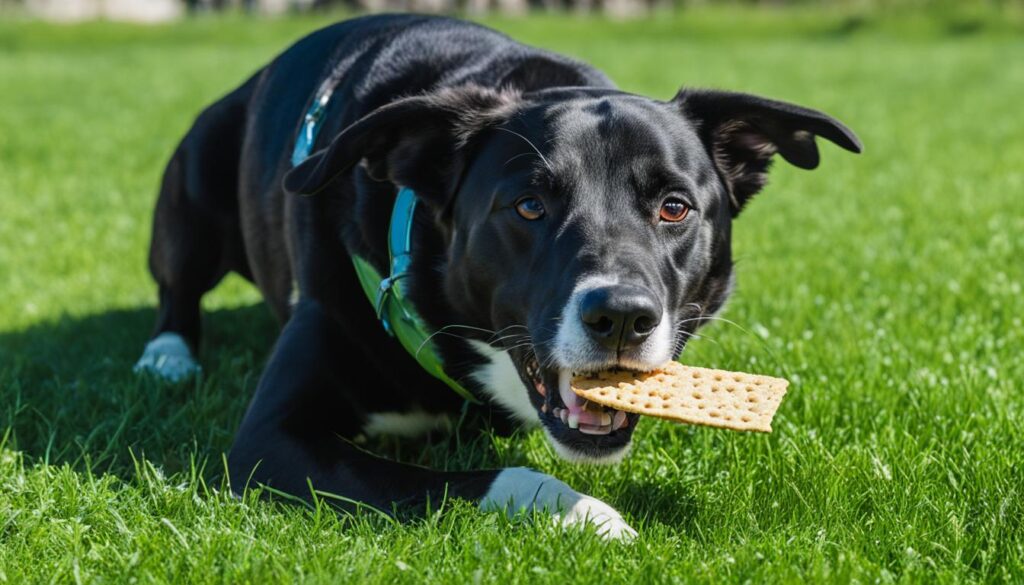
Some types of crackers contain seeds, and while certain seeds can be beneficial for dogs in small amounts, it’s essential to be cautious.
Amaranth and quinoa are two seeds that may offer some health benefits to dogs, but it’s crucial to consult with a vet before incorporating them into your dog’s diet.
Chia seeds and hemp seeds can also be suitable options, as they contain fiber and omega fatty acids. However, it’s important to be aware of potential choking hazards and the fact that even healthy seeds cannot replace the balanced nutrition provided by high-quality pet food.
Feeding crackers with seeds to your dog should be done with caution and under the guidance of a veterinarian. While some seeds offer nutritional benefits, it’s crucial to consider the potential choking hazard, especially for dogs prone to gulping their food.
Here is a table summarizing the potential health benefits and risks of seeds commonly found in crackers:
| Seeds | Health Benefits | Choking Hazard |
|---|---|---|
| Amaranth | Rich in protein and fiber | Potential choking hazard |
| Quinoa | Good source of protein and essential amino acids | Potential choking hazard |
| Chia | High in omega-3 fatty acids and fiber | Potential choking hazard |
| Hemp | Rich in omega-3 and omega-6 fatty acids | Potential choking hazard |
While seeds can provide some nutritional benefits, it’s important to prioritize your dog’s safety and consult with a veterinarian before introducing any new food items into their diet. Your vet can provide personalized recommendations based on your dog’s specific needs and health condition.
What About Graham Crackers and Other Sweet Crackers?
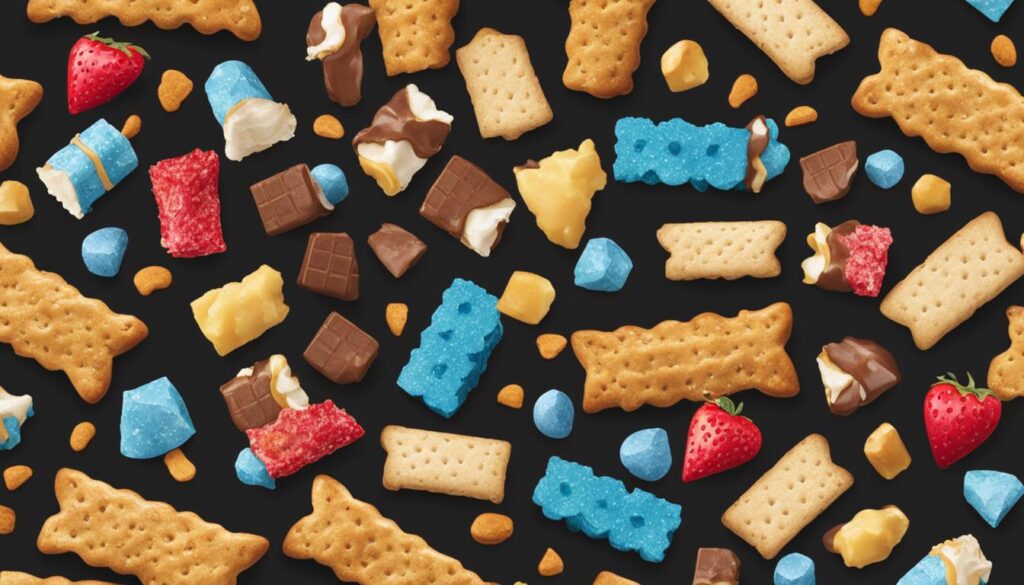
Sweet crackers, such as graham crackers, should be avoided when it comes to feeding dogs. These crackers are typically high in carbohydrates and sugar, which can lead to various health issues in dogs, including obesity and related complications. Additionally, some sweet crackers may contain ingredients that are toxic to dogs, such as chocolate. It’s best to stick to dog-friendly treats and avoid giving dogs any sweet crackers.
Can Dogs Eat Other Types of Crackers?
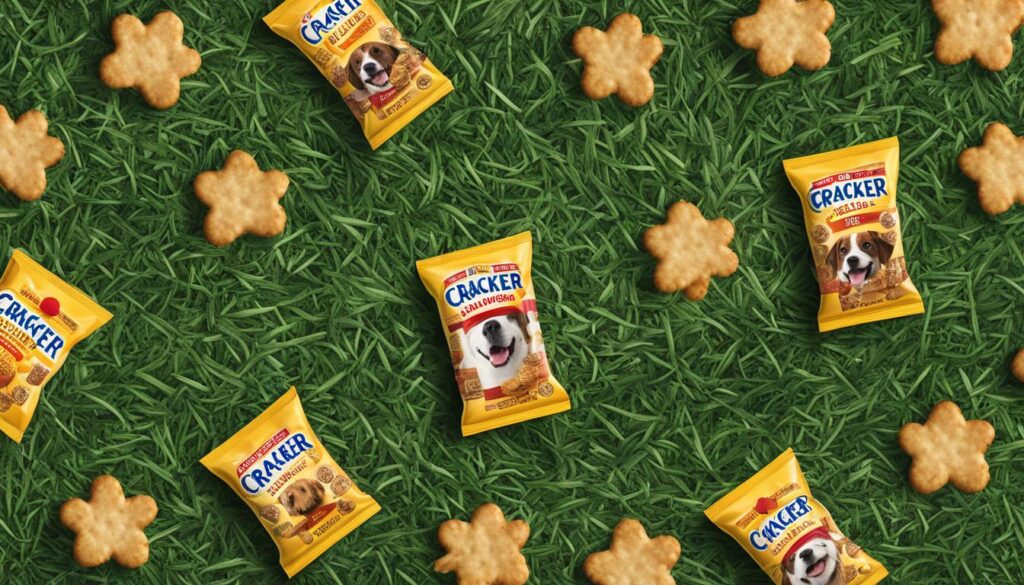
While saltine crackers have been the focus of this article, it’s important to consider the safety and nutritional value of other types of crackers as well. Belvita crackers, Chicken In A Biscuit crackers, Club crackers, Goldfish crackers, Ritz crackers, Toast Chee crackers, Triscuits, Wheat Thins, and various other crackers should also be approached with caution. These crackers can vary in their ingredients, sodium content, and potential harm to dogs. It’s best to consult with a vet before allowing your dog to consume any specific brand or type of cracker.
When it comes to the safety of different cracker brands for dogs, it’s important to consider their nutritional value and potential risks. Popular crackers such as Belvita, Chicken In A Biscuit, Club, Goldfish, Ritz, Toast Chee, Triscuits, and Wheat Thins are often enjoyed by humans, but are they safe for our canine companions?
Cracker Brand #1: Belvita Crackers
Belvita crackers are a popular choice for breakfast or as a snack throughout the day. However, it’s important to note that these crackers are not specifically formulated for dogs and may not offer the necessary nutritional value for their diet. While a small amount of Belvita crackers may not harm your dog, it’s best to stick to dog-friendly treats and food formulated for their specific needs.
Cracker Brand #2: Chicken In A Biscuit Crackers
Chicken In A Biscuit crackers may sound tempting for your furry friend, but it’s essential to consider their ingredients and potential harm to dogs. These crackers often contain salt, artificial flavors, and other ingredients that may not be suitable for canine consumption. It’s best to avoid feeding Chicken In A Biscuit crackers to your dog and opt for dog-friendly alternatives instead.
Cracker Brand #3: Club Crackers
Club crackers are a common choice for snacking, but are they safe for dogs? While plain Club crackers may not contain any harmful ingredients, they are still lacking in nutrition and should not replace a balanced diet specifically formulated for dogs. It’s important to prioritize your dog’s health and choose treats and snacks that provide them with the necessary nutrients they need.
Cracker Brand #4: Goldfish Crackers
Goldfish crackers are a favorite among many, both children and adults. However, when it comes to dogs, it’s important to exercise caution. These crackers often contain high levels of sodium, artificial colors, and flavors that may not be ideal for canine consumption. It’s best to avoid feeding Goldfish crackers to your dog and opt for healthier, dog-friendly snacks instead.
Cracker Brand #5: Ritz Crackers
Ritz crackers are a popular choice for sandwiches or as a standalone snack. While they may be enjoyed by humans, it’s important to consider their potential harm to dogs. Ritz crackers often contain added sugar, artificial flavors, and high levels of sodium, which may not be suitable for canine consumption. It’s best to avoid feeding Ritz crackers to your dog and choose treats that are specifically formulated for their nutritional needs.
Cracker Brand #6: Toast Chee Crackers
Toast Chee crackers are known for their distinct flavors and cheesy goodness. However, when it comes to dogs, these crackers may not be the best choice. Toast Chee crackers often contain artificial ingredients, high levels of sodium, and little nutritional value. It’s best to opt for dog-friendly treats and snacks that are formulated to meet your dog’s specific dietary needs.
Cracker Brand #7: Triscuits
Triscuits are a popular choice for those looking for a crunchy snack. However, when it comes to dogs, it’s important to be cautious. Triscuits often contain seasonings, such as garlic and onion, which can be harmful to dogs. These ingredients can cause anemia in dogs and should be avoided. It’s best to choose treats and snacks that are specifically made for dogs to ensure their safety and well-being.
Cracker Brand #8: Wheat Thins
Wheat Thins are a beloved snack for many, but are they safe for dogs? While plain Wheat Thins may not contain any harmful ingredients, they are still lacking in the necessary nutrition for dogs. These crackers are high in sodium and carbohydrates, which may not be suitable for a dog’s diet. It’s best to stick to dog-friendly treats and snacks that are formulated to meet their specific nutritional needs.
When considering the safety and nutritional value of different cracker brands for dogs, it’s important to consult with a vet. They can provide guidance on the best treats and snacks for your furry friend, ensuring that their dietary needs are met.
| Cracker Brand | Safety for Dogs | Nutritional Value |
|---|---|---|
| Belvita Crackers | Approach with caution | Lack significant nutritional value for dogs |
| Chicken In A Biscuit Crackers | Avoid feeding to dogs | Lack significant nutritional value for dogs, may contain harmful ingredients |
| Club Crackers | Approach with caution | Lack significant nutritional value for dogs |
| Goldfish Crackers | Avoid feeding to dogs | Lack significant nutritional value for dogs, may contain high levels of sodium and artificial ingredients |
| Ritz Crackers | Avoid feeding to dogs | Lack significant nutritional value for dogs, may contain added sugar, artificial flavors, and high levels of sodium |
| Toast Chee Crackers | Avoid feeding to dogs | Lack significant nutritional value for dogs, may contain artificial ingredients and high levels of sodium |
| Triscuits | Avoid feeding to dogs | Lack significant nutritional value for dogs, may contain harmful ingredients |
| Wheat Thins | Approach with caution | Lack significant nutritional value for dogs |
Are There Safer Alternatives to Saltine Crackers?
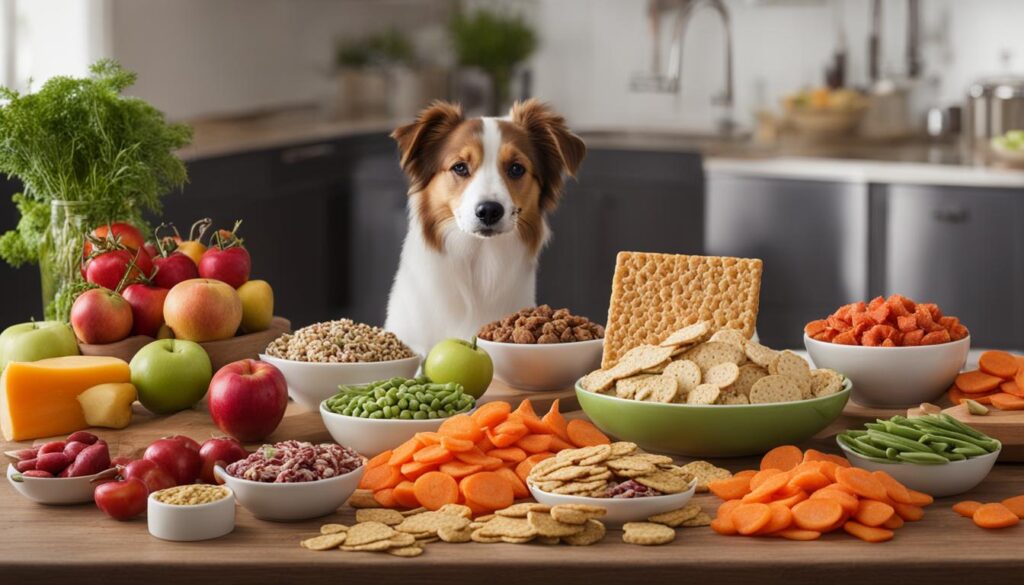
Instead of offering saltine crackers to your dog, there are safer alternatives available. Dog biscuits and other dog-friendly treats specifically formulated for canine nutritional needs are a better choice. These treats offer balanced nutrition and are designed to support your dog’s health. If you prefer, you can even make homemade dog treats using safe ingredients. It’s important to prioritize your dog’s health and provide them with treats that are beneficial and appropriate for their dietary requirements.
Dog biscuits, also known as dog cookies or dog treats, are a popular and convenient option for rewarding your furry friend. These treats come in a variety of flavors and textures, catering to different breeds and preferences. Dog biscuits are generally formulated with natural and wholesome ingredients, ensuring they meet your dog’s nutritional requirements while also satisfying their taste buds.
If you’re looking for an even more personalized approach, you can consider making homemade dog treats. This allows you to have full control over the ingredients and ensures that you’re providing your dog with a safe and healthy snack. There are countless recipes available online that utilize dog-friendly ingredients such as lean meats, vegetables, and whole grains. Just be sure to avoid any potential toxic ingredients such as chocolate, garlic, or onions.
By opting for dog biscuits or homemade treats, you can provide your dog with a flavorful and nutritious alternative to saltine crackers. Remember, the key is to prioritize your dog’s health and overall well-being when selecting treats. Always consult with your veterinarian for specific recommendations and guidelines based on your dog’s breed, age, and health condition.
Safe and delicious alternatives to saltine crackers include dog biscuits and homemade dog treats!
Benefits of Dog Biscuits:
- Formulated with canine nutritional needs in mind
- Wide variety of flavors and textures to cater to different dogs
- Convenient and ready-to-use for rewarding or training purposes
- Ensures balanced nutrition for your dog
Advantages of Homemade Dog Treats:
- You have full control over the ingredients
- Allows for a more personalized approach based on your dog’s preferences
- Avoids potential toxic ingredients found in store-bought treats
- Can be a fun and engaging activity for both you and your dog
Whether you choose dog biscuits or homemade treats, remember to provide them in moderation. Treats should only be given as an occasional supplement to your dog’s regular balanced diet. Too many treats, even the healthy ones, can contribute to weight gain and other health issues. Always consult with your veterinarian for personalized recommendations to ensure you are providing the best treats for your furry friend.
Wrapping Up

In conclusion, when it comes to saltine crackers, the question remains: Can dogs eat them? While saltine crackers may not pose an immediate danger to dogs when consumed in small quantities, it’s important to consider their nutritional value and potential health risks. Saltine crackers lack the necessary vitamins and minerals for a balanced canine diet and can contribute to issues such as obesity and sodium-related complications.
Dog nutrition should be prioritized, and it’s best to provide your furry friend with a diet specifically formulated for their needs. Consult with a vet to ensure you are offering appropriate treats and snacks that support your dog’s overall health and well-being.
Remember, your dog’s dietary needs are different from our own, and what may be tasty for us might not be suitable for our four-legged companions. Offering balanced dog-friendly snacks and treats, rather than relying on human food like saltine crackers, is essential for their long-term health.
With proper care and nutrition, you can provide your dog with a happy and fulfilling life, knowing that their diet is supporting their unique nutritional needs.
Additional Resources
If you’re looking for more information on dog nutrition and appropriate human food for dogs, here are some additional resources you may find helpful:
- Healthy Foods Checklist: Flaxseed for Dogs
- Salt Is Toxic To Pets | Pet Poison Helpline
- Sodium – chloride, tripolyphosphate, or nitrite: do dogs really need salt?
- Why Dogs Should NOT Eat ‘People Food’
- Salt Poisoning – Special Pet Topics – MSD Veterinary Manual
- Can Dogs Eat Quinoa?
- Dog Nutrition Basics – Essential Health Nutrients | Purina
- Guide to Grain-Free Dog Food
- Can Dogs Eat Pumpkin? | PetMD
- Can Dogs Eat Sunflower Seeds?
(These resources can provide more detailed information on specific nutrients, toxic ingredients, and dog-friendly food options.)
References
The information provided in this article was gathered from the following sources:
- “Should Dogs Eat Crackers?” by PetMD
- “Can Dogs Eat Saltine Crackers?” by Ultimate Pet Nutrition
- “Saltine Crackers and Dogs: Do They Mix?” by Crafty Papers
These sources provide valuable insights into the topic of dogs and crackers, including the potential risks and considerations when it comes to feeding your furry friend human food.
FAQ
Can dogs eat saltine crackers?
While small quantities of saltine crackers are not immediately harmful, they lack nutritional value and can lead to health issues such as stomach upset, allergic reactions, and obesity. It is best to prioritize a balanced and wholesome diet for your dog.
Why are crackers unhealthy for dogs?
Crackers, including saltine crackers, are primarily made from refined grains and often have limited nutritional value compared to whole grains. They can also contain high levels of sodium, which is not necessary for a dog’s diet. Additionally, some crackers may contain harmful ingredients such as garlic and onion, which can be toxic to dogs.
What about unsalted crackers?
While unsalted crackers may have lower sodium content, they are still high in carbohydrates and calories, lacking significant nutritional value. Feeding unsalted crackers regularly to your dog can contribute to weight gain and other health problems associated with a high-carb diet.
What about crackers with seeds?
Certain seeds, such as amaranth and quinoa, may offer some health benefits to dogs. However, it’s essential to consult with a vet before incorporating them into your dog’s diet. Chia seeds and hemp seeds can also be suitable options, but be cautious of choking hazards and remember that healthy seeds cannot replace a balanced diet.
What about graham crackers and other sweet crackers?
Sweet crackers are typically high in carbohydrates and sugar, which can lead to obesity and related complications in dogs. Some sweet crackers may also contain ingredients that are toxic to dogs, such as chocolate. It is best to avoid giving dogs any sweet crackers and focus on dog-friendly treats and snacks.
Can dogs eat other types of crackers?
Various types of crackers, such as Belvita crackers, Chicken In A Biscuit crackers, Club crackers, Goldfish crackers, Ritz crackers, Toast Chee crackers, Triscuits, and Wheat Thins, should be approached with caution. The ingredients, sodium content, and potential harm to dogs can vary. Consult with a vet before allowing your dog to consume any specific brand or type of cracker.
Are there safer alternatives to saltine crackers?
Yes, there are safer alternatives to saltine crackers for dogs. Dog biscuits and other dog-friendly treats specifically formulated for canines offer balanced nutrition and support your dog’s health. Homemade dog treats using safe ingredients can also be a good option.
What are some additional resources for dog nutrition and safe human food for dogs?
Here are some additional resources on dog nutrition and appropriate human food for dogs:
– Healthy Foods Checklist: Flaxseed for Dogs
– Salt Is Toxic To Pets | Pet Poison Helpline
– Sodium – chloride, tripolyphosphate, or nitrite: do dogs really need salt?
– Why Dogs Should NOT Eat ‘People Food’
– Salt Poisoning – Special Pet Topics – MSD Veterinary Manual
– Can Dogs Eat Quinoa?
– Dog Nutrition Basics – Essential Health Nutrients | Purina
– Guide to Grain-Free Dog Food
– Can Dogs Eat Pumpkin? | PetMD
– Can Dogs Eat Sunflower Seeds?
What are the references for this article?
The information provided in this article was gathered from the following sources:
– “Should Dogs Eat Crackers?” by PetMD
– “Can Dogs Eat Saltine Crackers?” by Ultimate Pet Nutrition
– “Saltine Crackers and Dogs: Do They Mix?” by Crafty Papers


